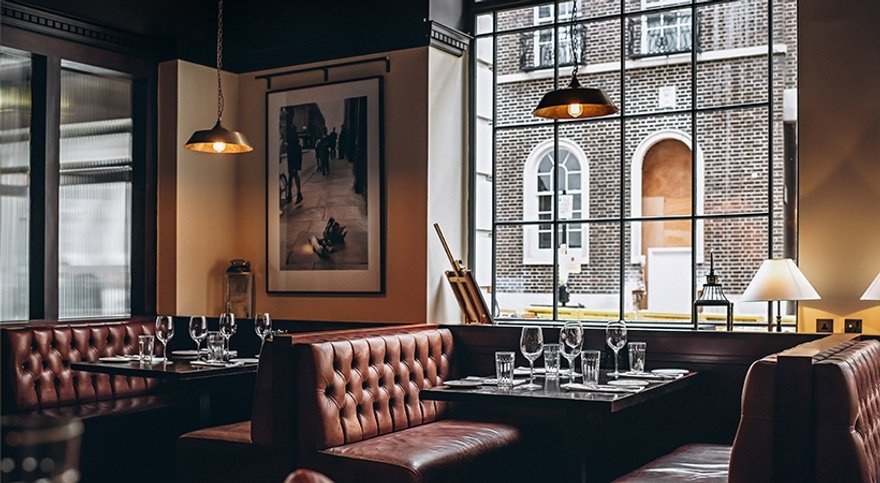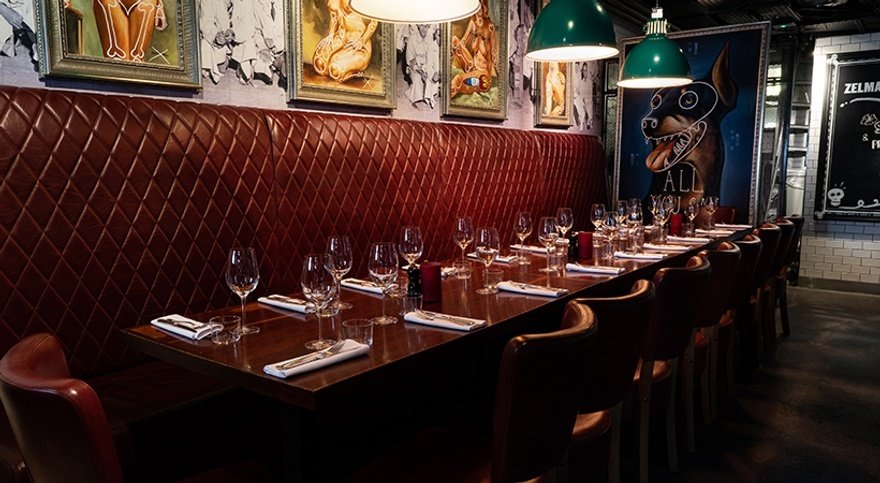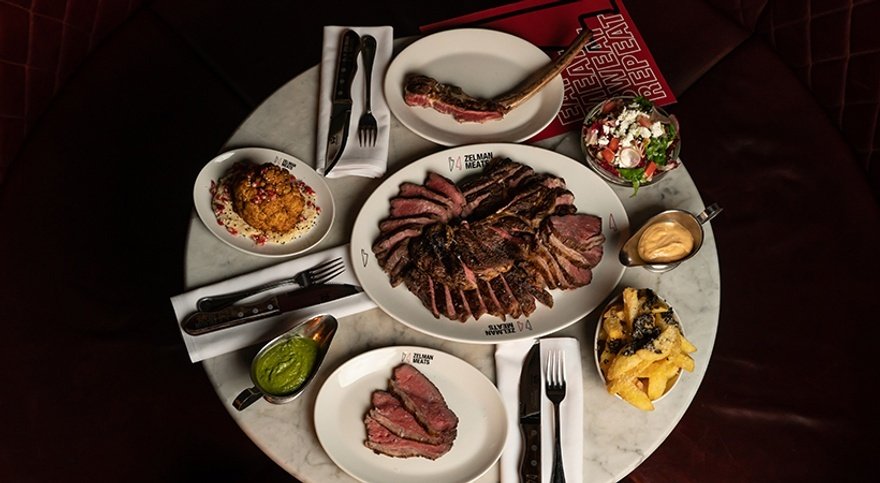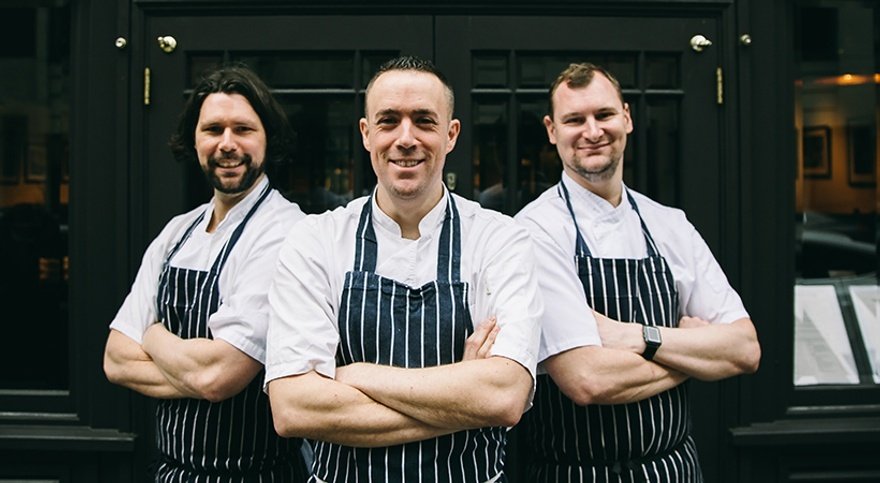We may be in Veganuary, but the appetite for meat in top-end restaurants shows no signs of diminishing. Tom Vaughan meets Misha Zelman – owner of London restaurants Goodman, Beast and Zelman Meats – and his top chefs, to talk the future of the business, environmentalism, British beef and rumours of a sale.
Misha Zelman is keen to point one thing out: reports of his death have been greatly exaggerated. Or, more accurately, the death/demise/sale of his restaurant empire. Rumours circulated last summer that his three Goodman restaurants and 11-strong Burger & Lobster chain were on the market. Not true, apparently.
"It was just speculation," he says. "It was nothing. Long story short, we had a few offers from potential buyers, but we said no thank you."
A sale would have brought to an abrupt end what has been a remarkable decade for Zelman. In terms of dominance of the London steak scene these past 10 years, only Hawksmoor can rival the influence of Zelman and his three business partners, Ilya Demichev, George Bukhov-Weinstein and his brother Roman Zelman. They currently operate six steakhouses across London under the Global Craftsman Group umbrella: American-style steakhouse Goodman (three sites, in Mayfair, the City and Canary Wharf), the king-crab-and-steak concept Beast in Marylebone, and "affordable" steakhouse concept Zelman Meats (two sites, in Soho and Knightsbridge).
Far from hitting the chopping block, all four brands could be about to enter a period of growth, he says. Just don't expect them to be popping up on every street corner.
"Generally speaking, I am conservative about the number of restaurants you can have and still preserve consistency," Zelman says. "In my opinion, the quality of restaurants goes down with more sites. It takes years to open a Goodman restaurant."
I remind him of something he said in 2006, shortly before launching his first Goodman restaurant in Moscow (he sold his Russian restaurants in 2012): "Goodman's will be like Starbucks one day." His eyes widen and he blows out his cheeks. "I said so many bullshit in my life. I might have said something like this."
Because if there is one thing that Goodman, a small chain obsessed with premium quality, isn't, it is Starbucks. In fact, its slow growth has been the antithesis of the coffee giant.
Operations director Alex D'Aguiar is sitting in with Zelman and takes the opportunity to chime in. "Doing something really well and simply is the key to our success," he says. "There's only been three Goodmans over the years. That's because when we do something, we want it to be perfect before moving on to the next one. Popping up on every street corner won't work for us."
The quality of restaurants goes down with more sites. It takes years to open a Goodman restaurant
Shell shock
There is, of course, an elephant in the room here. Or rather, a Burger & Lobster. Zelman and his partners also own the 11-strong global chain. For a while after the first one opened in 2011, it seemed like branches were popping up on every corner. "If I could buy a ticket for a time machine, I would not have opened so many Burger & Lobsters," Zelman admits. "I think it was a big mistake."
At its peak, Lobster & Burger (which operates separately from Global Craftsman Group) had 11 sites in London, one in Bath and another (a 240-cover venue) in Cardiff, a fact Zelman may be referring to when he says: "For a while we lost our grip on reality."
The result of such rapid expansion was a £10m loss in 2016 and drastic restructuring. Four restaurants were axed (two in London, plus the Bath and Cardiff sites), as was the £20 fixed-price, three-choice menu in place of an à la carte. The result was a 4% dip in turnover to £42m and a rebound in profit to £2.4m. The figures are down slightly for 2018 – at £38m turnover and £1.8m profit – but still healthy.
The rollercoaster ride that has been Burger & Lobster is in stark contrast to Goodman, which has seen sales hover around the £12m mark for 2017 and 2018 and pre-tax profits also stable around £850,000. Which in part explains Zelman's conservatism about further growth and his determination to get a concept right for expansion before, rather than after, the rollout. "That original Burger & Lobster concept was for the Mayfair crowd," he says. "I know those customers and what they want. I choose the three items for them. But it doesn't work for a global audience."
Know your audience
Zelman has long identified a need to attract a younger demographic to his steakhouses, which are usually the preserve of men in their forties and fifties. The answer was another Goodman spin-off – Zelman Meats, an "affordable" steak restaurant featuring lesser cuts of meat alongside premium steaks and a handful of sharing platters. It hasn't been plain sailing, though.
"We made mistakes with Zelman Meats," he says. "We tried to open a cheap steakhouse with different cuts of meat, but we didn't feel like we could be ambassadors of this concept. So we decided to stop and rebrand."
The team went about identifying Zelman Meats' core customers. "The customer profile that we identified recognises brands," says D'Aguiar. "They are young city professionals, aged 25 to 35. Dwell time is short, they want to be out and at a bar. What we wanted to do was create something that was affordable but with the same ethos that we call the Goodman way."
The beauty of the future is we don't know what it looks like. Look at Brexit: we don't know what is going on next month, so how do we know about next year?
The answer was to focus on a full sharing concept, allowing customers to sample different cuts of meat from around the world without blowing the bank. "A couple of months in and it's going well," says D'Aguiar. "It sits in a very competitive marketplace – Flat Iron, Blacklock, Meat Liquor – but we believe there's enough to go around for us to have some fun with it, but not to the extent of Burger & Lobster."
The Goodman way
The Goodman way – a dedication to getting the best beef possible – underpins the Goodman, Beast and Zelman Meats model. And the company's drive to achieve this over the past 11 years has been its standout success story, helping drive forward the standard of British beef in the process.
D'Aguiar insists there is room for expansion, while staying true to the Goodman way. "There's lots of international interest in Beast, but it has to be the right partner," he says. "Beast is a complex operation: we have a live product [king crab] that we need to get from one side of the world to the other."
So what about the Goodman steakhouses? "If the right opportunity presents itself, we'd love to do one or two more," D'Aguiar says.
It's been a big 11 years. Does Zelman have an idea where he'd like the group to be another 11 years down the line? He gives a little shrug. "The beauty of the future is we don't know what it looks like. Look at Brexit: we don't know what is going on next month, so how do we know about next year?" He thinks for a second and adds, with a smile: "Anyway, you brought up my Starbucks quote. Now I don't like to make any more crazy predictions."
Carnivores in the capital: Global Craftsman Group's three-brand portfolio
Annual group turnover £20m
Employees 300
Goodman Restaurants
Executive chef Tim Delaney on what makes Goodman different: "It was the original American steakhouse in London. One of the first to use the Jospa grill, one of the first to use US Department of Agriculture [USDA] meat. All three brands are different, but they all started with Goodmans."
Mayfair
Opened 2008
Covers 100
Average weekly covers 1,490
Address 24-26 Maddox Street, Mayfair, London
City
Opened 2011
Covers 128
Average weekly covers 1,240
Address 11 Old Jewry, London
Canary Wharf
Opened 2011
Covers 100
Average weekly covers 980
Address 3 South Quay, Isle of Dogs, London
Beast
Executive chef Phil Campbell on what makes Beast different: "We try to use a lot of older animals that we source from Spain and Portugal. You get a richer, deeper flavour. When you think about a wine, if you mature it in oak, it has a deeper, fuller flavour. It's the same with an animal: if you let it live for longer, it's going to influence the end product."
Opened 2014
Covers 120
Average weekly covers 750
Address 3 Chapel Place, Marylebone, London
Zelman Meats
Executive chef Olly Bird on what makes Zelman Meats different: "We cook on a robata grill. Have a sharing plate, so you can come in and all share all four cuts of meat and experience meats from all around the world."
Soho
Opened 2015
Covers 120
Average weekly covers 1,140
Address 2 St Anne's Court, Soho, London
Knightsbridge
Opened 2016
Covers 32
Average weekly covers 750
Address Harvey Nichols Fifth Floor, 109-125 Knightsbridge, London
Beef: standards and sustainability
When the first London Goodman opened, it sold 90% USDA steak and just 10% British. "A lot of people wanted to eat UK beef, but that consistency wasn't there," says Zelman Meats executive chef Olly Bird. "That is down to the fact that there are no official grading systems in place here."
British beef is judged by fat on the outside, but the US grading system focuses predominantly on marbling. So the Goodman team set about creating its own grading system.
"By using the US grading system and understanding where meat fits into it, we were able to come up with key points to look at on British beef," Bird explains.
Lake District Farmers
Looking for a supplier who could meet their high standards, the team was put in touch with Lake District Farmers and the relationship has since become central to Goodman's steak ratio, which now sits at 50% US and 50% British.
"It was very much about working with the supplier to get them on board with what we were trying to do and what we want from the beef," says Tim Delaney, executive chef at Goodman. "So they quickly understood when not to send us beef because we would just send it back."
Now, the supplier and the restaurant group are on the exact same page of what makes top-quality beef. "We use five different rare-breed cattle," says Phil Campbell, executive chef at Beast.
"We try to get in either geld or colt cattle – from four years old up to 12 years old. We've worked with a nutritionist to develop a feed for them. We'll allow them to retire for about four months on pasture. Then when the meat comes in there are three quality points we make sure to check: marbling, firmness and colour."
All of this is, of course, very labour-intensive, with a tonne and a half of beef that needs to be checked every week. The results have been worth it, though. "What we are getting from that is some of the best I've tried since I've been cooking beef," Campbell says.
"USDA was a wow thing 10 years ago," Bird says. "But it has stayed consistent. What has happened in the UK is that it has improved so much that when you have some British beef that has been dry-aged for 45 days, the punch when it hits is much more memorable than you'd get from a US steak, in my opinion."
Environmental concerns
It is widely accepted that global consumption of beef needs to be drastically cut to try and slow climate change. So where do the Goodman steak restaurants fit into this way of thinking?
"We all understand that the way forward is that we shouldn't be eating loads and loads of meat," Bird says. "But it is about eating quality products that are sourced in the right way and brought to the plate in the right manner. That's something in our company that we do take seriously. We go and vet the farms. For the American beef, we don't source from the huge farms, but smaller production units, and we go out and vet them personally."
Campbell adds: "How do you source sustainable and environmentally friendly beef – it's hard, right? Part of it is using small, responsible users – these guys aren't cutting down huge tracts of rainforest. It's about reducing the volume of meat we eat but upping the quality. As long as we keep focused on using people who really care about their animals, then we're doing what we can now. It's certainly an issue on all of our radars."
Continue reading
You need to be a premium member to view this. Subscribe from just 99p per week.
Already subscribed? Log In













